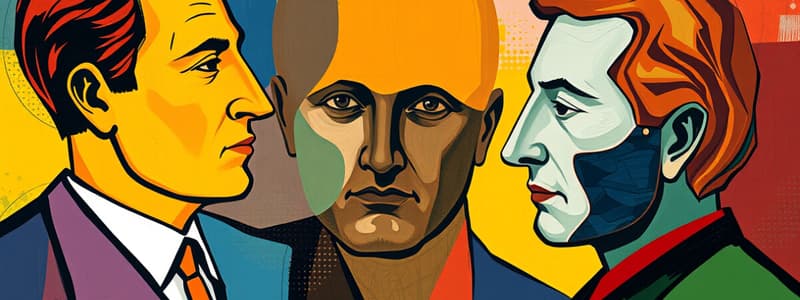Podcast
Questions and Answers
राजनीतिक विज्ञान की परिभाषा क्या है?
राजनीतिक विज्ञान की परिभाषा क्या है?
राजनीतिक विज्ञान शासन प्रणालियों, राजनीतिक गतिविधियों, राजनीतिक विचारों और राजनीतिक व्यवहार का अध्ययन है।
तुलनात्मक राजनीति का मुख्य अध्ययन क्षेत्र क्या है?
तुलनात्मक राजनीति का मुख्य अध्ययन क्षेत्र क्या है?
तुलनात्मक राजनीति विभिन्न राजनीतिक प्रणालियों और उनके विकास का विश्लेषण करती है।
अंतर्राष्ट्रीय संबंधों का अध्ययन किस बात पर केंद्रित है?
अंतर्राष्ट्रीय संबंधों का अध्ययन किस बात पर केंद्रित है?
अंतर्राष्ट्रीय संबंधों का अध्ययन देशों के बीच संबंधों, संघर्ष, कूटनीति और व्यापार पर केंद्रित है।
राजनीतिक विचार के प्रमुख विचारकों में कौन शामिल हैं?
राजनीतिक विचार के प्रमुख विचारकों में कौन शामिल हैं?
सार्वजनिक प्रशासन के अध्ययन का मुख्य विषय क्या है?
सार्वजनिक प्रशासन के अध्ययन का मुख्य विषय क्या है?
शक्ति और अधिकार में क्या अंतर है?
शक्ति और अधिकार में क्या अंतर है?
डेमोक्रेसी के प्रमुख लक्षण क्या हैं?
डेमोक्रेसी के प्रमुख लक्षण क्या हैं?
रेयलिज़्म सिद्धांत क्या बताता है?
रेयलिज़्म सिद्धांत क्या बताता है?
राजनीतिक संस्कृति का क्या महत्व है?
राजनीतिक संस्कृति का क्या महत्व है?
Study Notes
Overview of Political Science
- Definition: The study of systems of governance, political activities, political thoughts, and political behavior.
- Goals: To understand how power and resources are distributed, how decisions are made, and how societies function.
Key Subfields
-
Comparative Politics:
- Analyzes different political systems and their developments.
- Focuses on institutions, processes, and political behavior across countries.
-
International Relations:
- Examines relationships between countries, including conflict, diplomacy, and trade.
- Key theories include realism, liberalism, and constructivism.
-
Political Theory:
- Explores ideas and philosophies that shape political beliefs and systems.
- Key thinkers include Plato, Machiavelli, Hobbes, Locke, Rousseau, Marx, and Mill.
-
Public Administration:
- Studies the implementation of government policy and the behavior of public servants.
- Focuses on organizational theory and the management of public resources.
-
Public Policy:
- Analyzes the creation and effects of policies adopted by governments.
- Includes stages of policy-making such as agenda-setting, formulation, adoption, implementation, and evaluation.
Key Concepts
- Power: The ability to influence or control the behavior of people or the course of events.
- Authority: The legitimate power recognized by society, often held by institutions or individuals.
- Sovereignty: The authority of a state to govern itself or another state.
- Political Culture: The set of attitudes, beliefs, and sentiments that shape political behavior in a society.
Political Systems
-
Democracy: Characterized by free and fair elections, civil liberties, and political pluralism.
- Types: Direct and representative.
-
Authoritarianism: Centralized control, limited political freedoms, and often a single-party system.
-
Totalitarianism: An extreme form of authoritarianism with total control over public and private life.
-
Monarchy: Rule by a king or queen, can be absolute or constitutional.
Important Theories
- Realism: Focuses on the competitive and conflictual side of international relations.
- Liberalism: Emphasizes cooperation, democracy, and international institutions to promote peace.
- Constructivism: Focuses on the role of social constructs and identities in international relations.
Research Methods
- Qualitative: In-depth analysis of political phenomena through interviews, case studies, and historical analysis.
- Quantitative: Use of statistical methods to analyze political data and identify patterns.
Current Trends
- Globalization and its impact on state sovereignty.
- Rise of populism and nationalism.
- Digital governance and the influence of social media on politics.
- Environmental politics addressing climate change and sustainability issues.
राजनीतिक विज्ञान का अवलोकन
- परिभाषा: शासन प्रणालियों, राजनीतिक गतिविधियों, विचारों और व्यवहारों का अध्ययन।
- लक्ष्य: शक्ति और संसाधनों के वितरण, निर्णय लेने की प्रक्रियाएं और समाज कैसे संचालित होता है, को समझना।
प्रमुख उपक्षेत्र
- तुलनात्मक राजनीति:
- विभिन्न राजनीतिक प्रणालियों और उनके विकास का विश्लेषण।
- देशों में संस्थानों, प्रक्रियाओं और राजनीतिक व्यवहार पर ध्यान केंद्रित करता है।
- अंतर्राष्ट्रीय संबंध:
- देशों के बीच संबंधों का अध्ययन, जिसमें संघर्ष, कूटनीति और व्यापार शामिल हैं।
- मुख्य सिद्धांत: यथार्थवाद, उदारवाद और निर्माणात्मकता।
- राजनीतिक सिद्धांत:
- राजनीतिक विश्वास और प्रणालियों को आकार देने वाले विचारों और दर्शन का अन्वेषण।
- प्रमुख विचारक: प्लेटो, मचियावेली, हॉब्स, लॉक, रूसो, मार्क्स और मिल।
- सार्वजनिक प्रशासन:
- सरकारी नीतियों को लागू करने और सार्वजनिक सेवकों के व्यवहार का अध्ययन।
- संगठनात्मक सिद्धांत और सार्वजनिक संसाधनों के प्रबंधन पर ध्यान केंद्रित करता है।
- सार्वजनिक नीति:
- सरकारों द्वारा अपनाई गई नीतियों के निर्माण और प्रभावों का विश्लेषण।
- नीतिगत निर्माण के चरणों में एजेंडा-setting, रूपरेखा तैयार करना, अपनाना, लागू करना और मूल्यांकन शामिल हैं।
प्रमुख अवधारणाएँ
- शक्ति: लोगों के व्यवहार या घटनाओं के पाठ्यक्रम को प्रभावित करने या नियंत्रित करने की क्षमता।
- अधिकारिता: समाज द्वारा मान्यता प्राप्त वैध शक्ति, जो अक्सर संस्थानों या व्यक्तियों द्वारा धारण की जाती है।
- संप्रभुता: किसी राज्य की स्वयं को या अन्य राज्यों को शासन करने की क्षमता।
- राजनीतिक संस्कृति: उस सेट का समूह जो समाज में राजनीतिक व्यवहार को आकारित करता है।
राजनीतिक प्रणाली
- लोकतंत्र: स्वतंत्र और निष्पक्ष चुनावों, नागरिक स्वतंत्रताओं और राजनीतिक विविधता की विशेषता।
- प्रकार: प्रत्यक्ष और प्रतिनिधि।
- अधिनायकता: केंद्रीकृत नियंत्रण, सीमित राजनीतिक स्वतंत्रता और अक्सर एकल-पार्टी प्रणाली।
- पूर्ण अधिनायकता: अधिनायकता का एक चरम रूप, जो सार्वजनिक और व्यक्तिगत जीवन पर कुल नियंत्रण रखता है।
- राजतंत्र: राजा या रानी द्वारा शासन, यह निरंकुश (absolute) या संवैधानिक (constitutional) हो सकता है।
महत्वपूर्ण सिद्धांत
- यथार्थवाद: अंतर्राष्ट्रीय संबंधों के प्रतिस्पर्धात्मक और संघर्षात्मक पक्ष पर जोर देता है।
- उदारवाद: सहयोग, लोकतंत्र और शांति को बढ़ावा देने के लिए अंतर्राष्ट्रीय संस्थाओं पर जोर देता है।
- निर्माणात्मकता: अंतर्राष्ट्रीय संबंधों में सामाजिक निर्माणों और पहचानों की भूमिका को ध्यान में रखता है।
अनुसंधान पद्धतियाँ
- गुणात्मक: राजनीतिक घटनाओं का गहन विश्लेषण, जिसमें साक्षात्कार, केस अध्ययन और ऐतिहासिक विश्लेषण शामिल हैं।
- मात्रात्मक: राजनीतिक डेटा का विश्लेषण करने और पैटर्न पहचानने के लिए सांख्यिकीय विधियों का उपयोग।
वर्तमान रुझान
- वैश्वीकरण और इसके राज्य संप्रभुता पर प्रभाव।
- जनतांत्रिकता और राष्ट्रवाद की वृद्धि।
- डिजिटल शासन और राजनीति में सोशल मीडिया का प्रभाव।
- पर्यावरणीय राजनीति, जिसमें जलवायु परिवर्तन और स्थिरता के मुद्दे शामिल हैं।
Studying That Suits You
Use AI to generate personalized quizzes and flashcards to suit your learning preferences.
Description
इस क्विज में राजनीति विज्ञान के विभिन्न पहलुओं का अवलोकन किया जाएगा, जैसे कि राजनीतिक सिद्धांत, अंतरराष्ट्रीय संबंध और सार्वजनिक प्रशासन। इसके जरिए आप राजनीतिक व्यवस्था, विचारों और व्यवहार को समझने में मदद करेंगे।




